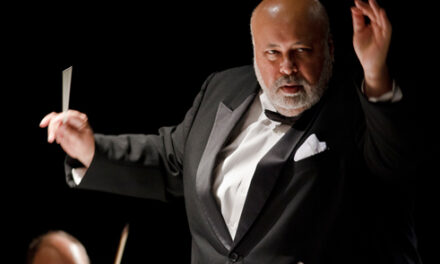While opera productions at the main campus of Central Piedmont Community College have been a fixture in the Charlotte cultural scene for decades, CPCC Opera Theatre has never been a robustly funded organization. As for the CPCC Opera Orchestra and the CPCC Opera Chorus, both are downright obscure. Unlike Opera Theatre, neither the orchestra nor the chorus has a nook at the CPCC website, and neither can claim to have continuously existed before 2006, when the Halton Theater opened at the extreme west side of the campus, directly facing the city’s Uptown.
Before then, productions at Pease Auditorium were Spartan affairs, with accompaniment as simple as a single piano for such masterworks as Cosi fan Tutte and Tosca. With the onus of drawing respectable crowds to the 1000-seat Halton, CPCC Opera had to offer more. The new facility has an orchestra pit that accommodates 24 musicians, supertitles can be projected across the broad proscenium, and ornate box seats are visible from everywhere in the house, prime spots for detonating dramatic surprises. Growing into this bigger home has been a work-in-progress. A well-cast Marriage of Figaro gave Opera Theatre new credibility in 2007, but the scenery for Giulio Cesare of 2008 came rising up from underneath the stage atop the capped orchestra pit displacing the Opera Orchestra – all 10 of them – fortified by the seven-member CPCC Early Music ensemble.
After a 2009 season that ended with a concert version of Un Ballo in Mascara, CP has admirably marshaled their resources for 2010 with a shrewder sense of attracting audience. Their February production of The Pirates of Penzance sported a solid cast, a 15-piece orchestra, and by far the most impressive scenery and costumes CPCC Opera has ever designed. No costume or scenery budget was required for the company’s latest effort, Mendelssohn’s Elijah, but it certainly brought an unprecedented number of singers and musicians onto the Halton stage, all 80 of them outfitted with musical scores. The Orchestra was nicely swelled to 21 members, but the Chorus, a wee group of 10 at Cesare, had now grown to 27 members. They in turn were fortified by the Vox choral group, 28 members strong, led by David Tang, who also conducted.
Tang indulged in a modest bit of staging, sending Richard Pendergraph up to one of those balcony-level boxes to declaim Elijah’s dire prediction of a three-year drought. Pendergraph replaced John Blizzard, himself a replacement for Doug Crawley, who sang the title role in Cesare and conducted Pirates. Having now heard all three baritones, I’ll state my preference for Blizzard. Yet Pendergraph, who replaced Blizzard for the final Sunday performance, offered some special claims of his own in the role of Israel’s most dynamic prophet. The sheer piercing power of Pendergraph’s voice, rife with steely impurities embedded in his wide vibrato, makes it a surprisingly apt instrument for scolding and mocking a nation and its false priests at the climactic “Contest on Mount Carmel” – and for summoning fire and rain from the heavens. At his best, his hieratic scorn has the nasty sound of Bryn Terfel on his benchmark London recording.
With its predilection toward alarum, Pendergraph’s voice found a simpatico partner in the soprano of Katie Doxzon, more anguished than tender as the Widow whose dead son Elijah revives, more urgent than protective as the Angel. Karen Erbe, plucked out of the Vox ensemble to sing the contralto angel, was conspicuously underpowered next to Doxzon but occasionally more than merely adequate. By contrast, the richly mellifluous tenor of John Kaneklides was a draught of cool water all-too-seldom heard in the recitatives of Obadiah, the righteous servant of the wicked King Ahab, and “If with all your hearts, ye truly seek Me,” his one air.
Halton’s wood-grained acoustic shell, which I’ve now sampled a few times in varied musical settings, seems ideally suited to a large-scale work such as Elijah, especially when it comes so prudently proportioned. The 54 voices of the combined choirs unleashed torrents of harmony, from the affrighted “Help, Lord! Wilt thou quite destroy us?” after the opening overture to the glorifying “And then shall your light break forth” at the end. With two trumpets, five violins, and punctilious timpanist Josh Walker, the CPCC Opera Orchestra had plenty of firepower of their own. Their finesse was best exemplified by cellist Nick Lampo whose tender fills and obbligato in Elijah’s “It is enough, O Lord, now take away my life” enhanced its poignancy.
Pruning of the score was mostly discreet, lopping off some of the Almighty’s flashes of power – already manifest in the voices of Pendergraph and the choir – and the exaltations of the heavenly angels toward the end of the oratorio. Only when Jezebel exhorted the people to help her avenge Elijah’s slaughter of the Priests of Baal at the brook of Kishon, there was a moment of awkwardness. That bit of butchery had been conspicuously excised from the denouement at Mount Carmel.











